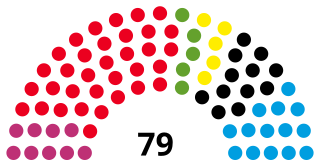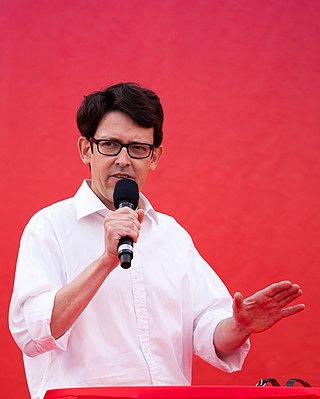Related Research Articles

Mecklenburg-Vorpommern, also known by its anglicized name Mecklenburg–Western Pomerania, is a state in the north-east of Germany. Of the country's sixteen states, Mecklenburg-Vorpommern ranks 14th in population; it covers an area of 23,300 km2 (9,000 sq mi), making it the sixth largest German state in area; and it is 16th in population density. Schwerin is the state capital and Rostock is the largest city. Other major cities include Neubrandenburg, Stralsund, Greifswald, Wismar, and Güstrow. It was named after the two regions of Mecklenburg and Fore Pomerania.

A Landtag is generally the legislative assembly or parliament of a federated state or other subnational self-governing entity in German-speaking nations. It is usually a unicameral assembly exercising legislative competence in non-federal matters.
Elections in Germany include elections to the Bundestag, the Landtags of the various states, and local elections.

Burg Stargard is a small town in the Mecklenburgische Seenplatte district, in Mecklenburg-Vorpommern, Germany. It is situated 8 kilometres (5.0 mi) southeast of Neubrandenburg.

The new states of Germany are the five re-established states of the former German Democratic Republic (GDR) that unified with the Federal Republic of Germany (FRG) with its 10 "old states" upon German reunification on 3 October 1990.
The administrative divisions of the German Democratic Republic were constituted in two different forms during the country's history. The GDR first retained the traditional German division into federated states called Länder, but in 1952 they were replaced with districts called Bezirke. Immediately before German reunification in 1990, the Länder were restored, but they were not effectively reconstituted until after reunification had completed.

The Landtag of Mecklenburg-Vorpommern is the people's representative body or the state parliament of the German federal state of Mecklenburg-Vorpommern.

The Landtag of Brandenburg is the unicameral legislature of the state of Brandenburg in Germany. Its 88 members of parliament are usually elected every 5 years.

In Germany, smoking is widespread and is subject to very few and lax regulations compared to other countries in Europe. Tobacco taxes in Germany are among the lowest in Europe. Germany ranks last on the Tobacco Control Scale and has sometimes been referred to as the "smoker's paradise" of Europe. According to German addiction researcher Heino Stöver, Germany has "[...] more cigarette vending machines than any other country in the world."

Jürgen Scharf is a German regional politician (CDU). From April 2002 till 2011 he was the leader of the CDU group in the Saxony-Anhalt Regional Assembly.
The Parliamentary Oversight Panel (PKGr) is a committee of the German Bundestag responsible for oversight of the intelligence agencies of Germany. The PKGr monitors the Federal Intelligence Service, the Military Counterintelligence Service, and the Federal Office for the Protection of the Constitution. Under the Control Body Act, the federal government is obliged to inform the PKGr comprehensively about the general activities of the federal intelligence services and about events of particular importance.
The Minister-president is the head of state and government in thirteen of Germany's sixteen states.

Philipp Amthor is a German politician of the Christian Democratic Union (CDU) who has been a member of the Bundestag since the 2017 German federal election. From 2018 to 2020, he worked as a lobbyist for the now inactive IT-company Augustus Intelligence.

Christian Kleiminger is a German politician and member of the Social Democratic Party of Germany (SPD). He was a member of The German Bundestag from 2005 until 2009.

In Germany's federal electoral system, a single party or parliamentary group rarely wins an absolute majority of seats in the Bundestag, and thus coalition governments, rather than single-party governments, are the usually expected outcome of a German election. As German political parties are often associated with particular colors, coalitions are frequently given nicknames based on the colors included. Prominent political parties in Germany are the CDU/CSU (black), the SPD (red), the Greens (green), the Left, the AfD (blue), and the FDP (yellow).

State Commissioner was the title for the provisional heads of government of the New states of Germany shortly after reunification.
Low German is a school subject in the northern German states Hamburg, Schleswig-Holstein, Mecklenburg-Western Pomerania and Bremen. In these states, it is part of Compulsory elective area, but in Bremen only as part of a pilot project. In Lower Saxony, Low German is partly integrated into the teaching of other subjects, there is no separate school subject. In North Rhine-Westphalia, Brandenburg and Saxony-Anhalt, the northern parts of which belong to the Low German language area, there are voluntary Low German courses, mainly in the form of working groups. Low German is not taught across the board in any of the federal states; it is only offered at individual schools in the northern German states.
A parliamentary group in Germany is an association of several members of a parliament, especially in the Bundestag, whose number does not reach the minimum size of a fraktion. The rights of a group are usually limited compared to a parliamentary group, but the group has more rights than an Independent Member of Parliament.
The Mecklenburg-Western Pomerania State Office for the Protection of the Constitution is the state office for the protection of the constitution in Mecklenburg-Western Pomerania and one of 19 intelligence services in Germany. As Department 5, it is part of the Ministry of the Interior and Sport of the State of Mecklenburg-Western Pomerania, based in the state capital Schwerin. It was founded in 1991, and is divided into five departments with over 100 positions and also uses intelligence resources for its tasks. The operating budget amounted to 1.580 million euros in 2019.
References
- ↑ "Geschäftsordnung des Landtags von Baden-Württemberg" (PDF) (§ 17). landtag-bw.de. Archived from the original (PDF) on 2016-04-02. Retrieved 2019-08-09.
- ↑ "Geschäftsordnung für den Bayerischen Landtag (BayLTGeschO)" (PDF) (§ 5). bayern.landtag.de. Retrieved 2019-08-09.
- ↑ "Geschäftsordnung des Abgeordnetenhauses von Berlin (GO Abghs)" (PDF) (§ 7, § 9a). parlament-berlin.de. Retrieved 2019-08-09.[ permanent dead link ]
- ↑ "Gesetz über die Rechtsstellung und Finanzierung der Fraktionen im Landtag Brandenburg (Fraktionsgesetz - FraktG)" (§ 1, § 18). bravors.brandenburg.de. Retrieved 2019-08-09.
- ↑ "Geschäftsordnung" (§ 16, § 17). bremische-buergerschaft.de. Retrieved 2019-08-09.
- ↑ "Fraktionsgesetz" (§ 1, § 6). landesrecht-hamburg.de. Retrieved 2019-08-09.
- ↑ "Geschäftsordnung des Hessischen Landtags vom 16. Dezember 1993 (GVBl. I S. 628)" (PDF) (§ 40). hessischer-landtag.de. Archived from the original (PDF) on 2022-01-17. Retrieved 2019-08-09.
- ↑ "Geschäftsordnung des Niedersächsischen Landtages" (PDF) (§ 2). landtag-niedersachsen.de. Retrieved 2020-09-22.[ permanent dead link ]
- ↑ "Geschäftsordnung des Landtages Mecklenburg-Vorpommern" (PDF) (§ 38). landtag-mv.de. Retrieved 2019-08-09.
- ↑ "Verfassung des Landes Mecklenburg-Vorpommern" (PDF) (Artikel 25). landtag-mv.de. Archived from the original (PDF) on 2017-12-01. Retrieved 2019-08-09.
- ↑ "Geschäftsordnung des Landtags Nordrhein-Westfalen" (§ 11). landtag.nrw.de. Archived from the original on 2017-12-22. Retrieved 2019-08-09.
- ↑ "Geschäftsordnung des Landtags Rheinland-Pfalz" (PDF) (§ 8). landtag.rlp.de. Retrieved 2019-08-09.
- ↑ "Gesetz Nr. 1379 über die Rechtsstellung und Finanzierung der Fraktionen des Landtages des Saarlandes (Fraktionsrechtsstellungsgesetz)" (PDF) (§ 1). landtag-saar.de. Retrieved 2022-05-13.
- ↑ "Geschäftsordnung des Sächsischen Landtags (GO)" (PDF) (§ 14). landtag.sachsen.de. Retrieved 2019-08-09.
- ↑ "Geschäftsordnung des Landtages von Sachsen-Anhalt" (PDF) (§ 2). landtag.sachsen-anhalt.de. Retrieved 2019-08-09.
- ↑ "Geschäftsordnung des Schleswig-Holsteinischen Landtages" (§ 22). gesetze-rechtsprechung.sh.juris.de. Retrieved 2019-08-09.
- ↑ "Geschäftsordnung des Thüringer Landtags" (PDF) (§ 8). thueringer-landtag.de. Retrieved 2019-08-09.